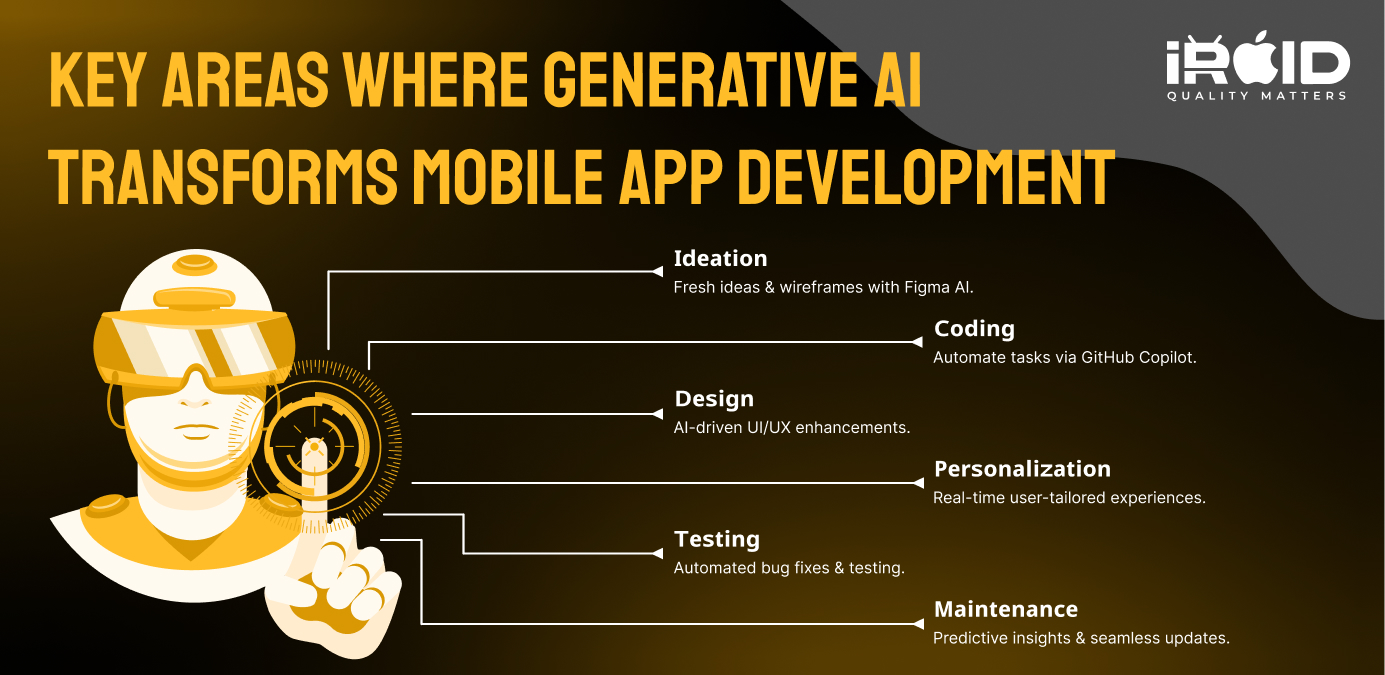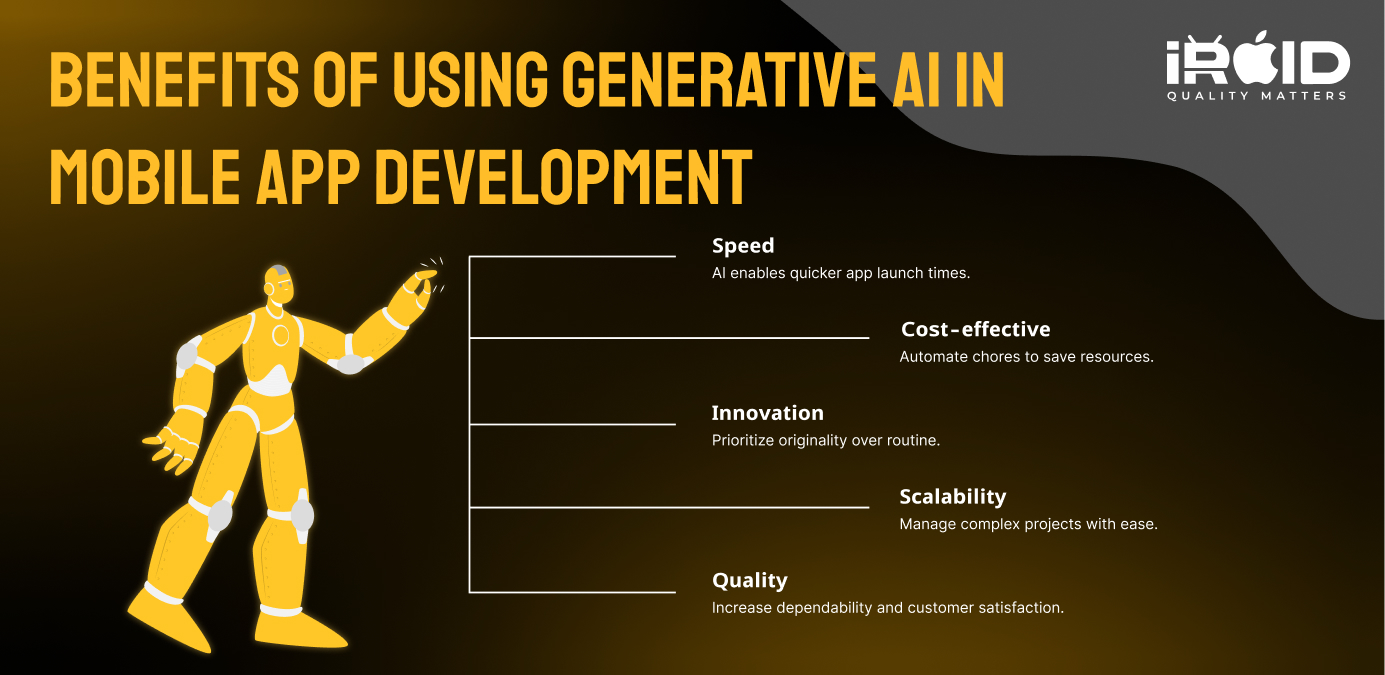1. Introduction
Generative AI has rapidly gained traction, impacting a wide range of industries, and mobile app development is no exception. Its innovative capabilities are reshaping how developers approach their projects, making them more efficient and creative.
The importance of this topic lies in the fact that generative AI is a true game-changer for mobile app development. As developers navigate the complex landscape of creating user-friendly, efficient applications, the assistance of AI can significantly ease the journey. This post provides an overview of how generative AI influences everything from the initial idea to the final launch, changing how we develop applications at every stage.
2. What is Generative AI?
Generative AI refers to a class of artificial intelligence designed to create content. It can generate text, produce images, and even write code, thanks to advanced machine learning models. Key capabilities of generative AI include:
-
Text Generation: Producing human-like text, useful for descriptions and user communications.
-
Image Synthesis: Creating high-quality visuals based on prompts or existing styles.
-
Code Creation: Auto-generating code snippets to expedite development tasks.
The backbone of generative AI consists of machine learning models like GPT (text generation), DALL-E (image creation), and others. These models mesh smoothly with traditional development tools, enhancing productivity while allowing developers more room for creativity.
3. Key Areas Where Generative AI Transforms Mobile App Development
3.1 Ideation and Prototyping
Generating fresh app ideas is often a challenge for developers. Generative AI can aid in brainstorming sessions, suggesting innovative concepts that may not have been considered otherwise. Tools like Figma AI allow developers to quickly create mockups and wireframes, speeding up the visualization of concepts before coding begins.
3.2 Code Generation
One of the more practical applications of generative AI is in automating boilerplate code and repetitive tasks. AI-powered tools like GitHub Copilot provide real-time suggestions as developers write code, alleviating the burden of mundane coding tasks and letting them focus on more complex problems.
3.3 UI/UX Design Enhancement
When it comes to design, generative AI can offer invaluable suggestions based on best practices, helping designers create visually appealing and user-friendly interfaces. It can also automate the generation of responsive and accessible designs, ensuring that apps function seamlessly across various devices.
3.4 Personalization and User Experience
In today’s app landscape, personalization can significantly enhance user experience. Generative AI can analyze user behavior and preferences to adapt content in real time, making interactions more relevant and engaging. This kind of direct personalization helps retain users and improve satisfaction.
3.5 Testing and Debugging
Testing can often be a painstaking process, but generative AI can automate test case generation and streamline bug fixes. Tools that simulate user behavior allow developers to run comprehensive tests, ensuring that apps function correctly and efficiently before launch.
3.6 Deployment and Maintenance
Once an app is deployed, maintaining its performance is crucial. Generative AI can provide insights for predictive maintenance, helping developers identify potential issues before they escalate. Automating updates and patches further simplifies the maintenance process, reducing the workload on development teams.
4. Benefits of Using Generative AI in Mobile App Development
-
Speed and Efficiency: AI reduces time to market, allowing developers to launch their apps sooner.
-
Cost Reduction: By automating tasks, teams can save both time and resources, leading to lower project costs.
-
Innovation Boost: Generative AI enables developers to focus on creative problem-solving rather than getting bogged down by routine tasks.
-
Scalability: With AI's assistance, developers can tackle complex and scalable projects more easily.
-
Improved Quality: AI helps enhance app reliability and user satisfaction, leading to better overall performance.
5. Challenges and Limitations
However, while the benefits are significant, there are challenges to consider:
-
Accuracy and Reliability: Sometimes, AI-generated content can be inaccurate or not up to standard.
-
Over-reliance on AI: An overdependence can lead to decreased human oversight and creativity.
-
Ethical Concerns: Issues like privacy and data security can arise with AI-driven applications.
-
Learning Curve: Adapting to new AI tools may require a shift in workflow for some teams.
6. Real-World Applications and Success Stories
Several companies are already leveraging generative AI in their mobile app development processes. For example, some startups have successfully used AI to create personalized shopping experiences, drastically increasing user engagement and satisfaction.
Case studies show that businesses adopting generative AI technologies have experienced significant increases in efficiency and innovation, leading to more effective app releases and happier users.
7. Tools and Technologies Driving the Change
Popular generative AI tools that aid app development include:
-
ChatGPT: Great for generating text and concepts swiftly.
-
Codex: Assists with code generation, improving coding efficiency.
-
GitHub Copilot: Provides code suggestions and helps automate coding tasks.
-
DALL-E and MidJourney: These tools can create stunning designs for mobile apps.
-
Firebase Predictions and TensorFlow: Used for personalization and analytics, helping tailor user experiences.
8. Future of Mobile App Development with Generative AI
Looking ahead, we can anticipate several trends in AI and mobile development. The integration of generative AI is likely to create autonomous app development platforms, where the process is even more streamlined. As AI continues evolving, app ecosystems will transform, leading to smarter, more adaptive applications.
9. Conclusion
In conclusion, generative AI is transforming mobile app development by increasing efficiency, creativity, and customisation. From ideation and prototyping to testing, debugging, and maintenance, AI-powered solutions are expediting the whole development process. While issues like as accuracy and over-reliance persist, the advantages clearly exceed the drawbacks. As this technology advances, it promises to alter how apps are developed, resulting in smarter, more dynamic applications. At iRoid Solutions, we utilize the potential of generative AI to provide unique solutions that are personalized to your specific requirements. For additional information or to begin your next project, please contact us.
Blog Related FAQs:
Generative AI refers to AI technologies that create content, including text, images, and code. In mobile app development, it assists in ideation, automating coding tasks, designing UI/UX, personalizing user experiences, and streamlining testing and maintenance.
Generative AI tools offer intelligent design suggestions, create responsive and accessible interfaces, and analyze user behavior to deliver personalized, engaging experiences.
Generative AI tools like GitHub Copilot or Codex produce reliable code and assist in finding and fixing bugs. However, human oversight is crucial to ensure accuracy and quality.
Generative AI benefits various industries, including e-commerce, healthcare, education, finance, and social media, by creating tailored and innovative app solutions.
At iRoid Solutions, we integrate Generative AI into our development process to deliver smarter, faster, and highly personalized app solutions tailored to client needs.
Recent Blog Posts
Get in Touch With Us
If you are looking for a solid partner for your projects, send us an email. We'd love to talk to you!
















